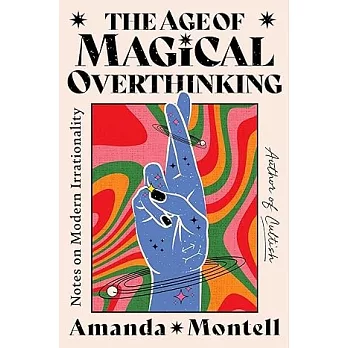作家、語言學家和熱門Podcast主持人的亞曼達.蒙泰爾(Amanda Montell),以敏捷的思路,觀察當今社會上各種奇怪的現象,探討一些非理性的意見、甚至是偏見,為何會擴張成社會上的主流想法,形成非理性的狂想年代。她機智幽默的文筆,讓我們在閱讀一系列文化評論與散記時,就像和一位聰明的朋友對談般暢快!
亞曼達觀察到,博學、富魅力的人士,更易於將內心一些「奇想」擴散到外部世界,對原本不相干的人事物產生影響,形成廣泛的認知偏誤。她生動地描述善於經營氛圍的心靈導師、帶明星光環的意見領袖,他們的形象和具感染力的言論,如何左右了一大群人的思想。作者精闢的解析陪伴我們在混亂中沉澱思緒,反思自己做出的各項選擇,是否真合乎理性。(文/博客來編譯)
From the bestselling author of Cultish and host of the podcast Sounds Like a Cult, a delicious blend of cultural criticism and personal narrative that explores our cognitive biases and the power, disadvantages, and highlights of magical thinking.
Utilizing the linguistic insights of her “witty and brilliant” (Blyth Roberson, author of America the Beautiful?) first book Wordslut and the sociological explorations of her breakout hit Cultish, Amanda Montell now turns her erudite eye to the inner workings of the human mind and its biases in her most personal and electrifying work yet.
“Magical thinking” can be broadly defined as the belief that one’s internal thoughts can affect unrelated events in the external world: Think of the conviction that one can manifest their way out of poverty, stave off cancer with positive vibes, thwart the apocalypse by learning to can their own peaches, or transform an unhealthy relationship to a glorious one with loyalty alone. In all its forms, magical thinking works in service of restoring agency amid chaos, but in The Age of Magical Overthinking, Montell argues that in the modern information age, our brain’s coping mechanisms have been overloaded, and our irrationality turned up to an eleven.
In a series of razor sharp, deeply funny chapters, Montell delves into a cornucopia of the cognitive biases that run rampant in our brains, from how the “Halo effect” cultivates worship (and hatred) of larger than life celebrities, to how the “Sunk Cost Fallacy” can keep us in detrimental relationships long after we’ve realized they’re not serving us. As she illuminates these concepts with her signature brilliance and wit, Montell’s prevailing message is one of hope, empathy, and ultimately forgiveness for our anxiety-addled human selves. If you have all but lost faith in our ability to reason, Montell aims to make some sense of the senseless. To crack open a window in our minds, and let a warm breeze in. To help quiet the cacophony for a while, or even hear a melody in it.



 天天爆殺
天天爆殺  今日66折
今日66折 


























 博客來
博客來 博客來
博客來 博客來
博客來 博客來
博客來 博客來
博客來